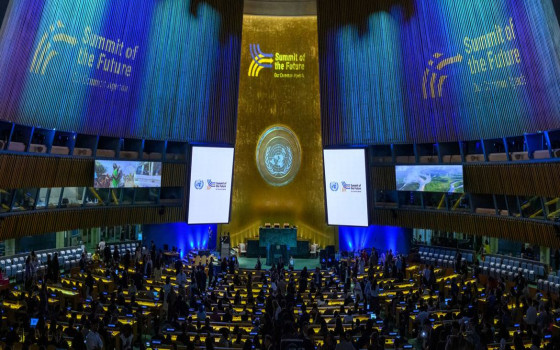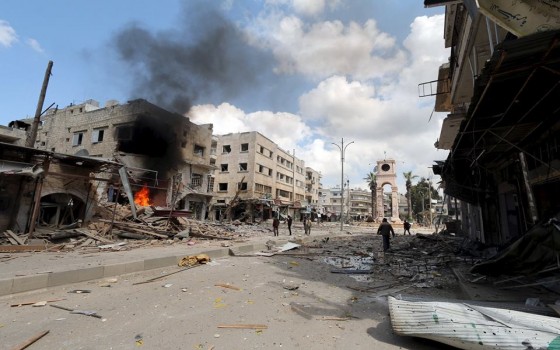
Participation of Arab countries in the Future Summit: Challenges, solutions and reform

- Europe and Arabs
- Monday , 23 September 2024 9:1 AM GMT
New York: Europe and the Arabs
The Future Summit was opened at the United Nations headquarters with the adoption of a charter that lays the foundations for reform and work on several tracks, including peace and security, sustainable development and artificial intelligence. About 144 senior officials and delegates spoke on the first day of the summit, including 9 representatives of Arab countries. According to the United Nations daily news bulletin
Yemen
Rashad Mohammed Al-Alimi, Chairman of the Presidential Leadership Council in Yemen, said that his country is participating in the Future Summit, and has ambitions to prove that countries experiencing wars and institutional fragility can keep pace with global progress as long as there is the will and creative thinking to catch up.
He said that Yemen's journey over the past decade has been full of suffering and difficult challenges brought about by the "Houthi militia war", leaving behind massive destruction in all aspects of life, adding that Yemen is today one of the largest humanitarian crises in the world.
He stressed that despite these enormous challenges, "the steadfastness and determination of the Yemeni people remain strong and steadfast in striving for a better future." He pointed to Yemen's success in contracting with the international Starlink company to provide internet service, "which we are counting on to enhance the exchange of information and knowledge and enable girls and boys to join distance education and protect them from being attracted by violent groups and extremist organizations."
Al-Alimi said: "We are also working with the rest of the members of the international community to formulate a different strategy towards Yemen based on moving from relief to sustainable development, and looking seriously at the youth and future agenda, just as we are keen on the agenda of ending the conflict and achieving comprehensive peace."
Kuwait
The Crown Prince of the State of Kuwait, Sheikh Sabah Khaled Al-Hamad Al-Sabah, renewed his country's appeal to the necessity of everyone's commitment to the law, international charters and treaties, while stressing the importance of dealing with one ruler away from double standards.
Al-Sabah said: "Perhaps what is happening in Palestine is a genocide that has claimed the lives of more than 41,000 Palestinians, the majority of whom are women and children, and the Security Council's inability to stop this aggression is a clear and unfortunate example of the double standards approach in applying international law, which must have no place in our future so that we do not slip into a world dominated by the jungle policy." He also called on the international community to push more towards negotiations and work to accelerate the pace of reforming the international system to translate the current reality and current challenges to reach a comprehensive, effective, transparent and accountable Security Council. He pointed to the challenges facing developing and least developed countries, including cross-border challenges related to the broader development field and challenges related to climate and its rapid changes, "which showed us the need to take into account the actual application of the principle of equitable geographical representation and to avoid discrimination and politicization." He referred to his country's efforts and progress in implementing the National Development Plan and striving to achieve the Sustainable Development Plan 2030 and Kuwait Vision 2035.
Iraq
Iraqi Prime Minister Mohammed Shia al-Sudani said that his country is committed to working with the international community to find common solutions and build a better and more sustainable future for all. However, he stressed that development and sustainable development "cannot be achieved while we are under the threat of war in the region, which threatens world peace, so it is necessary to work to stop aggression and war and establish security and stability."
He added that Iraq seeks to strengthen its international relations on the basis of mutual respect and common interests, while adhering to the principle of not allowing its territories to be used to attack other countries. He said: "Achieving peace requires a joint international effort, and we believe that diplomacy and dialogue are the key to achieving stability."
Mr. al-Sudani said that Iraq is taking serious steps towards achieving sustainable development and effectively responding to the goals of the National Development Plan 2024-2028 by adopting comprehensive strategic reforms. He stressed that achieving a balance between the three dimensions of sustainable development is a priority for his government, through sustainable economic growth, equal opportunities and environmental protection. The Iraqi Prime Minister said that his country is aware of the magnitude of the challenges posed by climate change, and is working to support investments aimed at diversifying the economy away from oil. He stressed the need to give Iraq "priority in climate finance as it is one of the most affected countries."
Qatar
Qatari Prime Minister and Minister of Foreign Affairs, Sheikh Mohammed bin Abdulrahman bin Jassim Al Thani, stressed the importance of strengthening global governance, including reforming international financing structures, alleviating the debt burden and bridging the digital divide, pointing to the serious challenges that hinder the world's economic progress and threaten its social peace and efforts to achieve the sustainable development goals.
He added that "efforts must be strengthened to achieve sustainable economic growth and social welfare based on protecting human rights and empowering women, in addition to strengthening climate action."
Bin Jassim stressed that "development cannot be achieved without establishing the foundations of peace and stability, so the State of Qatar continues its tireless efforts in mediation to prevent the outbreak of conflicts and resolve them through peaceful means," referring to his country's current mediation between Palestinian factions and Israel in partnership with Egypt and the United States, "to stop this disastrous and brutal war on the Gaza Strip."
He reiterated his country's call for a ceasefire agreement, the release of prisoners and detainees, and taking a clear and firm position on violations of international law and international humanitarian law regarding the repeated attacks on schools, hospitals, relief workers and displaced persons in Gaza.
At the national level, he pointed out that his country launched this year the third phase of its national development strategy within the framework of Qatar Vision 2030, in order to build a diversified and sustainable knowledge-based economy.
Oman
The Minister of Foreign Affairs of the Sultanate of Oman, Badr bin Hamad Al Busaidi, said that the Future Summit - which comes at a time when the world is witnessing unprecedented challenges - requires a collective response
Deeper and more comprehensive international cooperation. He added: "If the vision is clear, the goal will be achieved, and the challenges we face today require an ambitious vision and strong collective commitment."
He stressed that his country believes that international cooperation is the best solution to address various global issues, reiterating its readiness to cooperate with all member states to achieve the "ambitious goals" reflected in the Charter for the Future.
Al-Busaidi said that the challenges facing the world cannot be addressed by traditional methods alone, "so we must act wisely and insightfully and begin implementing policies that put future generations at the center of attention and prepare them for a better and more sustainable future."
He stressed that technology and digital cooperation are a decisive factor in addressing environmental, economic and social challenges. He said that the Sultanate of Oman attaches great importance to the role of youth as "the driving force for building the future", so it has launched many initiatives and innovation incubators in various scientific, industrial, cultural and sports fields, aiming to empower youth and develop their creative abilities, and create an environment that meets their aspirations and ambitions. Egypt
Egyptian Foreign Minister Badr Abdel Aati said that his country sees the Future Summit as an opportunity to enhance multilateral action in the face of challenges that cast a shadow over developing countries and affect their efforts to achieve sustainable development.
He stressed that Egypt was keen to organize the Aswan Forum for Peace and Sustainable Development on the summit track to present its vision on the priorities of multilateralism, governance, the prevention agenda, sustainable peace, and the role of youth.
Abdel Aati stressed the need to stop the "ongoing aggression on the Gaza Strip and the West Bank," and stressed that confidence in the justice of the international system "is now being tested in light of the international community's inability to stop the ongoing tragedy," which now threatens to extend to Lebanon and spread widely in the region.
He also highlighted the importance of increasing development financing and reforming the structure of the global financial system to narrow the gaps between countries and address the "current imbalance of leaving many countries behind the prosperity train." He urged providing means to implement and enhance technology transfer, promote digital cooperation, and increase research and development programs and capacity building, especially in the African continent, in addition to supporting the efforts of African countries to confront the negative effects of climate change "based on the principle of common but differentiated responsibilities."
He added: "We must work together to address the challenge of water scarcity, enhance cross-border water cooperation, and preserve the water security of countries, away from unilateral policies that represent a blatant violation of the principles of international law."
Tunisia
During his speech, Mohamed Ali Nafti, Tunisian Minister of Foreign Affairs, stressed the need to reform international cooperation mechanisms based on mutual respect and human solidarity. He also stressed the importance of adopting summit documents, such as the Charter for the Future, which aims to achieve sustainable development and reduce the digital divide.
The Tunisian minister stressed the importance of political will in order to achieve the results of the summit, which he described as an opportunity to achieve real and tangible change. He pointed out that the true success of the summit remains linked to everyone's serious engagement in implementing its contents "so that it does not remain mere declarations of good intentions."
He added: "We hope that this summit, which the Secretary-General (of the United Nations) has worked hard to prepare for, will be the starting point for a new phase of multilateral action under the banner of the United Nations, based on shared responsibility and human solidarity for a more just, secure, and sustainable world."
The Tunisian minister also stressed the importance of civil society organizations in enhancing multilateral action to address global challenges such as poverty, hunger, armed conflicts and climate change.
He also pointed out the need to support the Palestinian people as part of the international community’s commitment to leaving no one behind.
Bahrain
Abdullatif bin Rashid Al Zayani, Minister of Foreign Affairs of Bahrain, expressed in his speech the hope of his country’s government that the Future Summit would yield positive results in line with the Charter for the Future.
He said that the world is facing serious challenges that require renewed commitment to effective international action to address them, stressing the Kingdom of Bahrain’s commitment to established values and principles in order to achieve sustainable development.
Al Zayani also touched on the Arab Summit hosted by the Kingdom of Bahrain last May, noting that the Kingdom had made strenuous efforts to ensure that the Arab Summit would come out with fruitful and constructive decisions and results.
He added that the summit affirmed the Arab consensus on the need to end the Palestinian-Israeli conflict through a two-state solution. The summit also adopted an initiative to hold and host an international peace conference in the Middle East, he said.
The summit, according to the Bahraini minister, demonstrated the commitment of Arab countries to confronting the broader humanitarian and development challenges facing our world, as it included initiatives aimed at expanding access to healthcare and education for those affected by conflicts in cooperation with UN agencies and deepening cooperation in the field of financial technology with the aim of enhancing prosperity for all peoples of the region.
Sudan
Sudanese Foreign Minister Hussein Awad Ali affirmed his country's government's support for the efforts of the UN Secretary-General, aimed at reforming the international organization in light of the current crises that he said threaten "not only our current generation, but future generations and our planet in which we live."
He expressed his regret for the double standards, and called for strict adherence to the UN Charter and its principles, stressing the need to respect the sovereignty of states and not interfere in their affairs.
He stressed the need to avoid focusing on some principles and neglecting others or trying to reinterpret these principles and rules, "as our international system is dependent on respecting the principles of the UN Charter, especially non-interference in the internal affairs of states, respecting their sovereignty and territorial integrity, and not using force in international relations."
The Sudanese minister also referred to the challenges facing developing countries, such as poverty, conflicts, and climate change.Stressing the need to reform the international financial architecture to meet the needs of these countries.
He called for strengthening priorities related to combating poverty and ensuring the right to development. He also mentioned the importance of improving the representation of developing countries in international financial decision-making and facilitating access to financing and support.
The Sudanese Foreign Minister said that the United Nations could be "an appropriate platform to lead the issues of international financial reform based on its interest in achieving the sustainable development goals and its responsibility for international peace and security."












No Comments Found